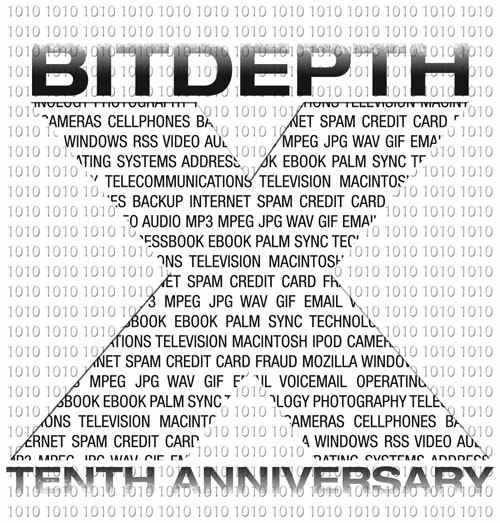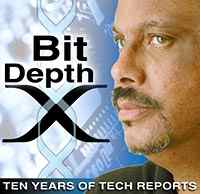BitDepth 520 - April 18
07/01/09 19:30 Filed in: BitDepth - April 2006
The column hits the big one zero, ten years of continuous publication. No excuse for the self-indulgence which follows...
Secrets of the Bithood

To mark the big one-zero, I invited fellow tech writer, one-time Cable Guy and artist Keifel Agostini to do the art for this instalment. Graphic by Keifel Agostini.
This is BitDepth number 520 and brings an official anniversary of sorts after ten years of almost continuous publication. It began as a space filler, written for free in the Express TV Guide in September 2005 and graduated after fifteen instalments to the Op-Ed page of the Express. Since 1998, it has been published by the Trinidad Publishing Company, mostly in the Guardian with a sidestep to accompany me to the company's tabloid experiment The Wire for a year and a half.
With each move has come an opportunity to rethink and expand what BitDepth might be and to reconsider what technology coverage means in Trinidad and Tobago. The column has always been about helping people find a toehold in their comprehension of modern technology, which can be as puzzling as it is exciting.
The name plays off that process of enriching learning, and is taken from the concept of colour depth in a monitor, which tends to become clearer and more attractive the more bits are assigned to drawing the image onscreen. Ergo, the more "bits" you read, the clearer things would become.
Of course, the name is also a bit of an anachronism these days. When BitDepth began, many computers drew their screen pictures with a bare minimum of colour, usually 256 bits, today's systems toss more bits than that around in a nanosecond and you couldn't find a screen that displays that measly density of colour if you tried.
I thought for a long time about what I should write about in this column, which began with the introduction of Windows 95 and now anticipates Vista, but why change a winning formula? BitDepth has always been about sharing my experiences with all kinds of technology and so we'll answer the questions that have recurred time and again since I began the column.
Why do you use a Macintosh?
Short answer. Because it makes sense for me.
Longer answer. The whole Mac and Windows thing has always been a smokescreen for eccentric brand loyalty and commercial interests. For me, the most important insight that a computer user can have is the moment of epiphany that instant when the logic of the computer becomes apparent and they begin working with the computer rather than against it.
Because Macs have long had a more rigorous lock on their user experience, that moment of insight has tended to come more easily for Mac users than for the average Windows user in my experience.
But Windows users, particularly young ones, have their epiphanies too and when it happens, they become liberated from the machine and the OS and begin to work with computers in a whole different way.
Do I need to change my computer?
I don't know, do you really? The useful life of a computer system tends to be driven by what you actually do with it. If you push your equipment to its limits with large photographic files, fast video games, or home movie projects, you'll probably find that updating every two years or so will keep you in sync with the rapid changes that make demands on computers used for those tasks.
If you use the Internet, do word processing and other basic work with your computer, you'll probably find that updating your anti-virus software, clearing out unused junk like old downloads and upgrading your RAM to at least 512MB will be enough to give an older system a new lease on life.
That said, I've noticed that many computer makers now have a tendency to install cheaper parts in their computers anticipating a useful life of two years. A rash of blown capacitors crippled thousands of machines over the last eighteen months. To save a few cents on a tiny part, manufacturers were willing to risk the anger of their customers. Disturbing.
I want to improve my computer skills, should I take a course?
Better than a course, find a path. Almost everyone I know who has improved their skills on a computer has done so while working at something they enjoyed. The impetus to accomplish makes you read more deeply, question harder and hammer away until something gives.
It doesn't matter whether it's shopping online or working with photographs or playing games, the knowledge comes as you work with the machine and then you branch out to other things.
Photography brought me to computers sixteen years ago and because of that fascination, I learned about databases, word processors, web creation and presentation software. If you start with something you're excited about, you'll want to explore and learn, not cringe and suffer.
What's next?
BitDepth #521.

To mark the big one-zero, I invited fellow tech writer, one-time Cable Guy and artist Keifel Agostini to do the art for this instalment. Graphic by Keifel Agostini.
This is BitDepth number 520 and brings an official anniversary of sorts after ten years of almost continuous publication. It began as a space filler, written for free in the Express TV Guide in September 2005 and graduated after fifteen instalments to the Op-Ed page of the Express. Since 1998, it has been published by the Trinidad Publishing Company, mostly in the Guardian with a sidestep to accompany me to the company's tabloid experiment The Wire for a year and a half.
With each move has come an opportunity to rethink and expand what BitDepth might be and to reconsider what technology coverage means in Trinidad and Tobago. The column has always been about helping people find a toehold in their comprehension of modern technology, which can be as puzzling as it is exciting.
The name plays off that process of enriching learning, and is taken from the concept of colour depth in a monitor, which tends to become clearer and more attractive the more bits are assigned to drawing the image onscreen. Ergo, the more "bits" you read, the clearer things would become.
Of course, the name is also a bit of an anachronism these days. When BitDepth began, many computers drew their screen pictures with a bare minimum of colour, usually 256 bits, today's systems toss more bits than that around in a nanosecond and you couldn't find a screen that displays that measly density of colour if you tried.
I thought for a long time about what I should write about in this column, which began with the introduction of Windows 95 and now anticipates Vista, but why change a winning formula? BitDepth has always been about sharing my experiences with all kinds of technology and so we'll answer the questions that have recurred time and again since I began the column.
Why do you use a Macintosh?
Short answer. Because it makes sense for me.
Longer answer. The whole Mac and Windows thing has always been a smokescreen for eccentric brand loyalty and commercial interests. For me, the most important insight that a computer user can have is the moment of epiphany that instant when the logic of the computer becomes apparent and they begin working with the computer rather than against it.
Because Macs have long had a more rigorous lock on their user experience, that moment of insight has tended to come more easily for Mac users than for the average Windows user in my experience.
But Windows users, particularly young ones, have their epiphanies too and when it happens, they become liberated from the machine and the OS and begin to work with computers in a whole different way.
Do I need to change my computer?
I don't know, do you really? The useful life of a computer system tends to be driven by what you actually do with it. If you push your equipment to its limits with large photographic files, fast video games, or home movie projects, you'll probably find that updating every two years or so will keep you in sync with the rapid changes that make demands on computers used for those tasks.
If you use the Internet, do word processing and other basic work with your computer, you'll probably find that updating your anti-virus software, clearing out unused junk like old downloads and upgrading your RAM to at least 512MB will be enough to give an older system a new lease on life.
That said, I've noticed that many computer makers now have a tendency to install cheaper parts in their computers anticipating a useful life of two years. A rash of blown capacitors crippled thousands of machines over the last eighteen months. To save a few cents on a tiny part, manufacturers were willing to risk the anger of their customers. Disturbing.
I want to improve my computer skills, should I take a course?
Better than a course, find a path. Almost everyone I know who has improved their skills on a computer has done so while working at something they enjoyed. The impetus to accomplish makes you read more deeply, question harder and hammer away until something gives.
It doesn't matter whether it's shopping online or working with photographs or playing games, the knowledge comes as you work with the machine and then you branch out to other things.
Photography brought me to computers sixteen years ago and because of that fascination, I learned about databases, word processors, web creation and presentation software. If you start with something you're excited about, you'll want to explore and learn, not cringe and suffer.
What's next?
BitDepth #521.
blog comments powered by Disqus

